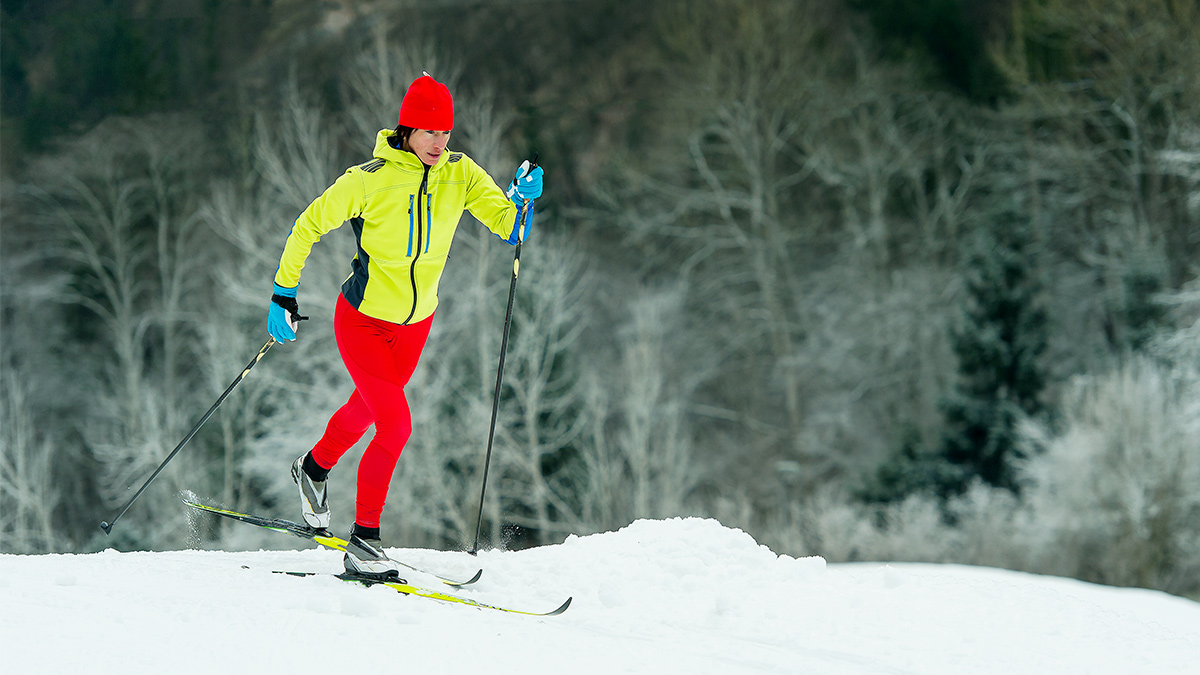If you live above 40th parallel north, you have (more or less) cold winters. For summer outdoor sports such as triathlon, cycling and running this represents a challenge. But does it have to? Do cold weather and short days really mean winter training blues—or can we see them as an opportunity for winter bliss?
Being a rational optimist, I vote for winter bliss. Here are seven excellent reasons why.
Become a stronger and more versatile athlete.
Cross-country skiing gives you both specific and unspecific muscular load, serious endurance, and the endless bliss of gliding through shining winter landscapes. It is also the sport that has produced the most VO2max records because of its high intensity and volume. Cross county skiing uses the most muscles of any sport (an estimated 600 out of the approximately 650 we have) especially targeting the main mover muscles we use to create propulsion in cycling and running. I equate 20km of cross-country to 80-100km on the bike—with double the fun! Learn how to skate really well and your winter will never be the same.
Apart from cross-country skiing, there are other wonderful winter sports such as ice skating, ski touring and even snowshoeing, which will all build your summer legs and lay the FUNdamentals for über-endurance. Speed skating and track cycling are particularly complementary sports in terms of physical requirements—though both can be done indoors during the cold season. Most of the rare examples of the same athletes winning medals in Summer and Winter Olympics are among speed skaters competing in track cycling—if you want to learn what it really means to have burning quads, try speed skating.
Build strength with power workouts.
Wintertime is a great time to work on your maximum power and overall strength, both indoors and outdoors. In just 8-10 weeks you can become a significantly stronger athlete with 1-2 weekly sessions of progressive strength & conditioning at the gym. You’ll also increase your range of motion and reduce your risk of injury for the upcoming spring training load. Also try introducing power elements to your outdoor sessions, like running and jumping stairs; adding squat jumps, push ups, dips etc to your running workouts; or swimming with paddles, parachutes and sponges. You can also get a decent power workout by simply slogging through deep snow.
Build technique with slow sessions.
Making a perfect movement slowly is infinitely more difficult than doing the same movement quickly. Have you ever tried to swim 25m with fewer than 10 strokes? Or do a very-very-very slow push-up, going down on 10 counts and then up on 10 counts? What about pushing a huge gear with below 50 cadence on your bike trainer? Slow can be painfully beautiful. Simply decompose your key moves, isolate their parts and execute them really slowly. Then add some load to it. It will build your technique and power in a very special way. Sometimes we have to slow down to get faster, and the best time to do it is in winter.
Push pedals on your turbo trainer.
Turbo training is a highly effective and efficient training tool. In less than an hour you can have the highest quality workout—and a puddle of sweat under you. You can watch a Netflix series, TED podcasts, listen to the music or race against others using Tacx, Zwift or Sufferfest apps. No traffic lights, full visibility of power output and gradient—it is all so good that some people get addicted. However I recommend having a plan here too. Set an objective for your FTP, pre-program power workouts that you want to be able to complete by end of February (like 5x8min at 300 Watt) and start now.
Plust, there’s no need to end your turbo training come spring. For time-crunched athletes, nothing beats the efficiency of a turbo trainer. Apart from having a coach, this is also one of the best investments you can make into your training.
Do a Holiday Training Camp at home.
Winter holidays represent a major danger for our racing weight. Between the inevitable end of year stress, seemingly-endless Christmas parties and important family commitments, it is very difficult and actually quite unnecessary to keep an iron discipline with your diet.
So go with the flow for a little while but maintain loose control—and then show some will and train like a pro for the week between Christmas and New Years, when your schedule will hopefully be a little more flexible. A 500km cycling challenge or 20km of swimming in a week will keep you sharp on your mission for your summer goals, even if you over-indulge a little over the holidays.
Plan your season.
This is a perfect time to review the season, derive key learnings, set new objectives, and sign up for races. When setting objectives, try to really think long-term and imagine where you want to be in 5 or 10 years—and which role sport should play in your life. Set both achievement and process goals, i.e. define not only what but also how you want to achieve your objectives, as well as the quality of life you want to have.
Just please don’t get carried away and sign up for too many races. It is all too easy to forget the fatigue and logistical issues of racing from the comfort of the living room sofa. Find something that you can look forward to, a stretch goal that maybe even scares you a bit, but not the one that completely terrifies you. This can be a fun process and the clarity achieved at the end of it will give you a lot of power.
Get your equipment ready and donate your stuff.
I’m guessing we all have too much sports stuff, and together we could likely equip several teams with the retired clothes and gear we have at home. Clean and keep the stuff you need, then clean and donate all the rest. It will make your logistics easier—and someone else maybe a bit happier.
Instead of dreading the cold dark months, this year look forward to your opportunities for winter bliss and you’ll start your spring races a happier, stronger, smarter athlete and human being!


